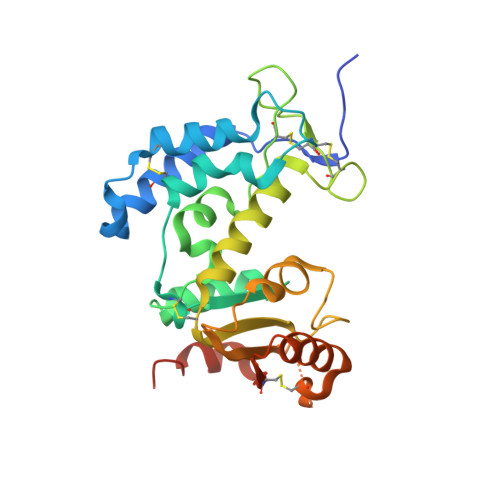Discovery of 4-Amino-8-quinoline Carboxamides as Novel, Submicromolar Inhibitors of NAD-Hydrolyzing Enzyme CD38.
Becherer, J.D., Boros, E.E., Carpenter, T.Y., Cowan, D.J., Deaton, D.N., Haffner, C.D., Jeune, M.R., Kaldor, I.W., Poole, J.C., Preugschat, F., Rheault, T.R., Schulte, C.A., Shearer, B.G., Shearer, T.W., Shewchuk, L.M., Smalley, T.L., Stewart, E.L., Stuart, J.D., Ulrich, J.C.(2015) J Med Chem 58: 7021-7056
- PubMed: 26267483
- DOI: https://doi.org/10.1021/acs.jmedchem.5b00992
- Primary Citation of Related Structures:
4XJS, 4XJT - PubMed Abstract:
Starting from the micromolar 8-quinoline carboxamide high-throughput screening hit 1a, a systematic exploration of the structure-activity relationships (SAR) of the 4-, 6-, and 8-substituents of the quinoline ring resulted in the identification of approximately 10-100-fold more potent human CD38 inhibitors. Several of these molecules also exhibited pharmacokinetic parameters suitable for in vivo animal studies, including low clearances and decent oral bioavailability. Two of these CD38 inhibitors, 1ah and 1ai, were shown to elevate NAD tissue levels in liver and muscle in a diet-induced obese (DIO) C57BL/6 mouse model. These inhibitor tool compounds will enable further biological studies of the CD38 enzyme as well as the investigation of the therapeutic implications of NAD enhancement in disease models of abnormally low NAD.
Organizational Affiliation:
GlaxoSmithKline Research and Development , 5 Moore Drive, P.O. Box 13398, Research Triangle Park, North Carolina 27709, United States.
















